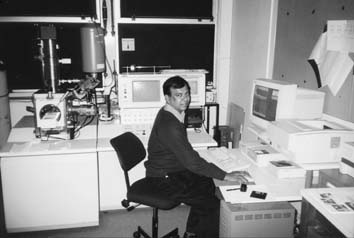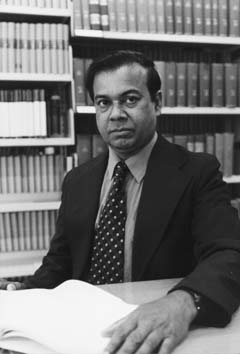Personal tools
News from ICTP 95 - Profile

ICTP Associate Bandara Karunaratne has spent much of his career putting physics to work to help boost the economy of his native country Sri Lanka.
Moulding the Future

Bandara Karunaratne
Sri Lanka is a small island-nation
that lies like a tear-drop off the southern coast of India. Rich
in cultural traditions and blessed with an abundance of natural
resources, the tranquility of this island-nation has been shattered
by violent ethnic upheavals in the northern province of Tamil,
which have left thousands of people dead and a once-pleasing landscape
scarred and battered.
ICTP Regular Associate (1997-2002) Bandara Karunaratne, a Sri
Lankan materials physicist, is determined to help put his native
land, which the world has often associated with tea, coconuts
and rubber, back on track by improving its capacity for scientific
training and research. He has been particularly interested in
investigating potential commercial applications of native materials.
"I received my undergraduate degree in physics in 1971 from
the University of Peradeniya, Sri Lanka, and earned my doctorate
in materials physics from the University of Warwick in the United
Kingdom in 1980," explains Karunaratne. "Immediately
following my graduation, I worked for a local timber firm, where
I examined the physical properties of the harvested lumber to
assess its durability after it was treated with borax, a preservative."
As a graduate student, Karunaratne broadened his materials research
at the University of Warwick to encompass silicon nitride ceramics.
"I wanted to investigate the microstructure and fracture
properties of these materials when subjected to extremely high
temperatures and pressures," he notes. "The ways in
which the materials respond to these conditions tell us a lot
about their durability. That, in turn, could have important implications
for their use in motor engines or cutting tools."
While completing his doctorate, Karunaratne, in collaboration
with the Lucas Research Group in the United Kingdom, conducted
research helping to illustrate that silicon nitride could serve
as a more efficient and longer lasting machine-cutting material
than carbon- and steel-cutting materials then in use. The research
eventually bore fruit in commercial applications under the trademark
syalon, which has found widespread use in the cutting tool
industry.
Karunaratne returned to Sri Lanka in 1980, assuming a teaching
position in the department of physics at the University of Peradeniya.
While attending to his teaching responsibilities, Karunaratne
also developed an active research agenda. Drawing on his knowledge
and previous training in materials physics, he devoted a great
deal of time examining the structural integrity and durability
of local ceramics--porcelains, bricks and tiles.
"My goal," Karunaratne notes, "has been to enhance
the applicability of these ceramics in the manufacture of materials
ranging from dinner plates to turbine blades." Most recently,
he has investigated the potential for ceramic rotary seals to
replace alumina seals in water pumps. "Since clay is much
cheaper than alumina and since our testing suggests that the ceramic
seals would be more durable, the research holds much promise for
possible commercial applications."

A key to Karunaratne's success is explained by the ties he
has established with other institutions. The International Programme
in Physical Sciences (IPPS) at the University of Uppsala in Sweden
offers both laboratory equipment and student fellowships, and
the University of Warwick sends materials used in experiments
and provides valuable lines of communication with former teachers
and colleagues. Meanwhile, his status as ICTP Associate has enabled
him to spend seven weeks last fall in Trieste, where he has taken
advantage of the Centre's library, internet facilities and proximity
to other well-respected scientific institutions to "stock
up on information that will undoubtedly prove invaluable to my
research and development activities when I return home."
The Centre's close relationship with the University of Trieste
has allowed Karunaratne to develop ties with Italian researchers
as well as to take advantage of the university's electronmicroscopic
facilities to conduct experiments that would be impossible to
do back home. Trieste's scientific facilities have also opened
a new world to Uthpala Dahanayake, a youthful Sri Lankan researcher
who has accompanied Karunaratne as an 'ICTP young collaborator.'
"Sergio Meriani and Valter Sergo, professors at the Materials
Engineering Department of the University of Trieste, have been
particularly helpful in strengthening the links between ICTP,
their university and my institution. It's all part of a growing
network of scientific interaction that would be impossible to
build without the Centre's long-standing reputation both in Italy
and abroad."